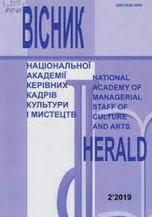ФОРМУВАННЯ УКРАЇНСЬКОЇ ІДЕНТИЧНОСТІ В ПРОЦЕСІ ВИКЛАДАННЯ КУРСУ «ФІЛОСОФІЯ» В ЗАКЛАДІ ВИЩОЇ ОСВІТИ ЗА УМОВ ВОЄННОГО СТАНУ
FORMATION OF UKRAINIAN IDENTITY IN "PHILOSOPHY" COURSE TEACHING IN TERTIARY EDUCATION INSTITUTION UNDER MARTIAL LAW
Author(s): Kateryna Mykhaylivna KyrylenkoSubject(s): Higher Education , State/Government and Education, Politics and Identity, Peace and Conflict Studies, Pedagogy
Published by: Національна академія керівних кадрів культури і мистецтв
Keywords: philosophy teaching in tertiary education institution; Ukrainian identity; educational experience of KNUC&A;
Summary/Abstract: The purpose of the article is to analyse the trends in activities by academic and teaching personnel of "Philosophy" course as a general subject to students of non-philosophical specialties, on the formation of Ukrainian identity among students of the first (bachelor's) level of tertiary education in the conditions of the current russia’s war against Ukraine. The article states that there is a rapidly growing demand for a systematic understanding of the phenomenon of Ukrainian identity in the Ukrainian society, so tertiary education institutions should develop effective ways of forming Ukrainian identity among their students. The results of the work of the Department of Philosophy and Pedagogy of the Kyiv National University of Culture and Arts (KNUK&A) on the formation of Ukrainian identity in the process of "Philosophy" course teaching during the war between russia and Ukraine and the imposition of martial law in Ukraine are highlighted. The article affirms that teaching the "Philosophy" course is a powerful resource for generating the foundations of forming Ukrainian identity in the prospective university graduate. The full-scale invasion of russia into Ukraine proved that the lecturer of the tertiary education institution should not only provide high-quality subject-professional training for the prospective graduate, but also find a proper place for the formation of Ukrainian identity during the educational process. The research methodology is based on the application of such general scientific methods as observation and generalisation, analysis, and synthesis. The scientific novelty of the research consists in familiarising the educational community with the work experience of the Department of Philosophy and Pedagogy of KNUK&A on the formation of Ukrainian identity among students during the "Philosophy" course in wartime. Conclusions. It was found that the way of forming a stable Ukrainian identity among students, important areas of the lecturer's educational and methodological work include the analysis of the concepts of "national identity", "individual", "collective", "conscious", "unconscious", and "fragmentary" identity in global intellectual studies and Ukrainian socio-political discourse; coverage of approaches to the interpretation of the Ukrainian national idea as the core of Ukrainian identity, debunking the myths of Russian propaganda, discussion with students of currently important topics; creating in the educational space an atmosphere of soft conviction in the need to build a Ukrainian-speaking social space; and the involvement of modern Ukrainian-language content in the educational process.
Journal: Вісник Національної академії керівних кадрів культури і мистецтв
- Issue Year: 2022
- Issue No: 3
- Page Range: 10-15
- Page Count: 6
- Language: Ukrainian

